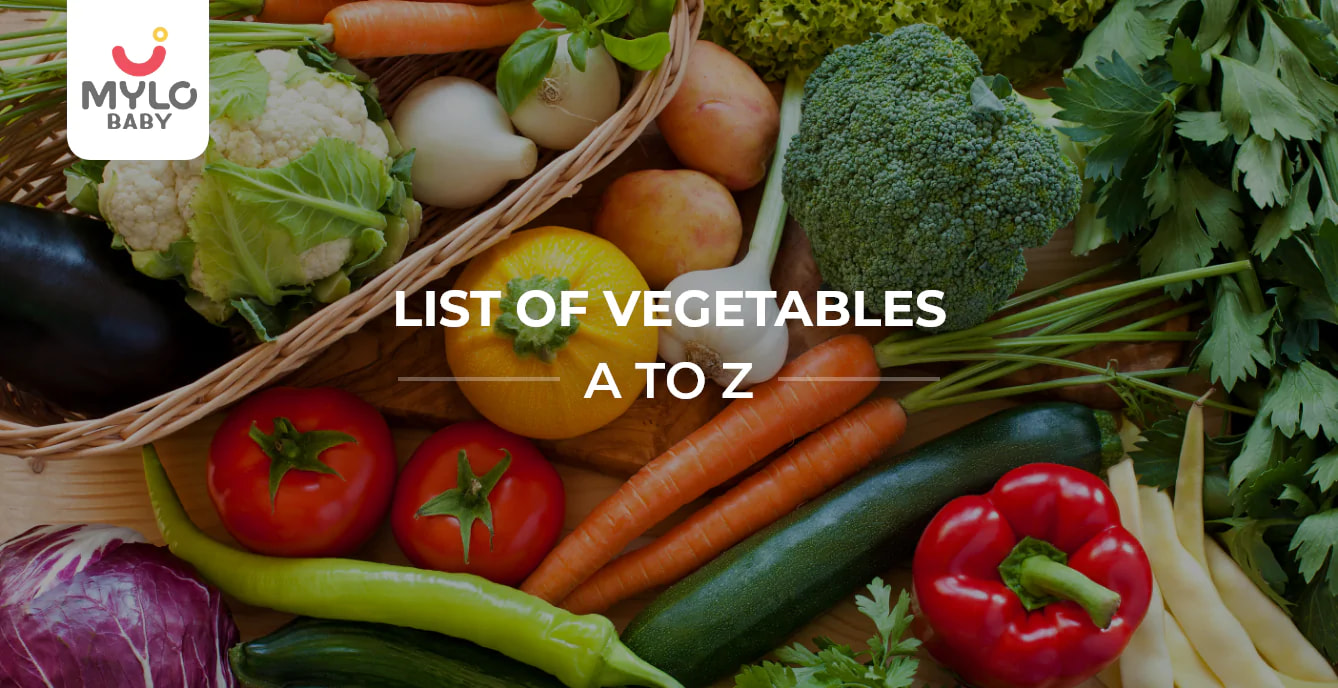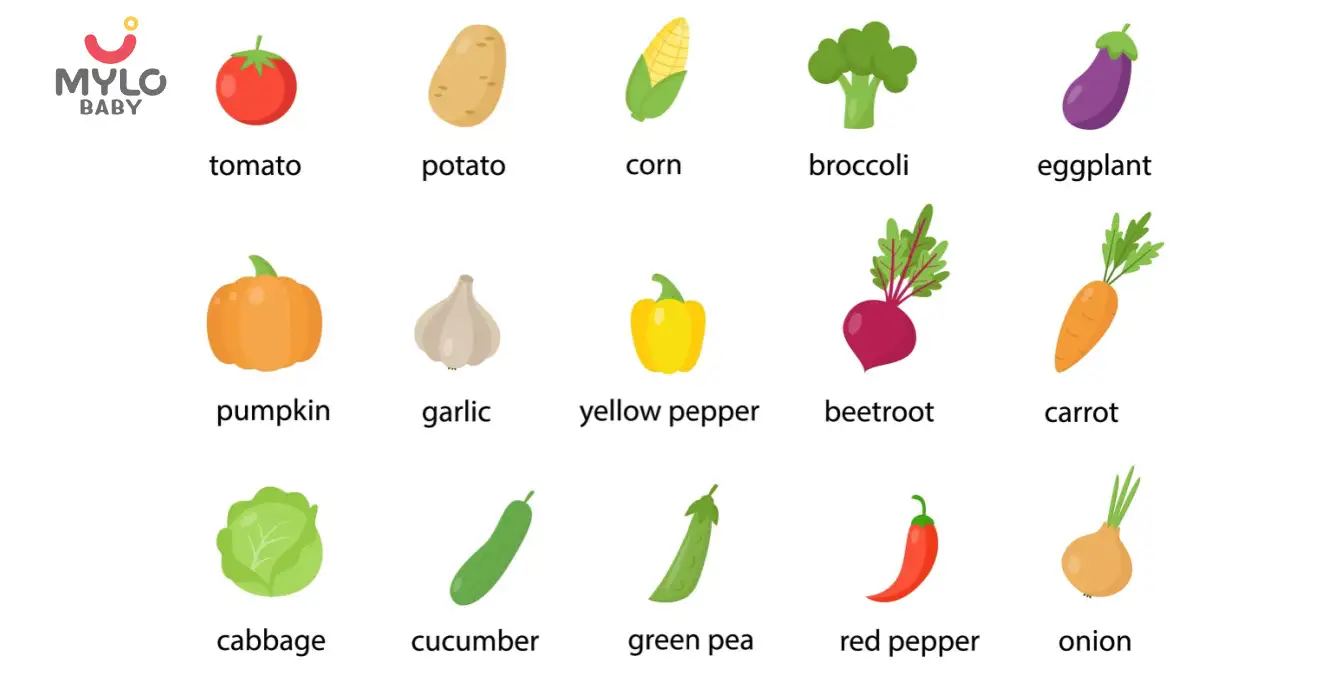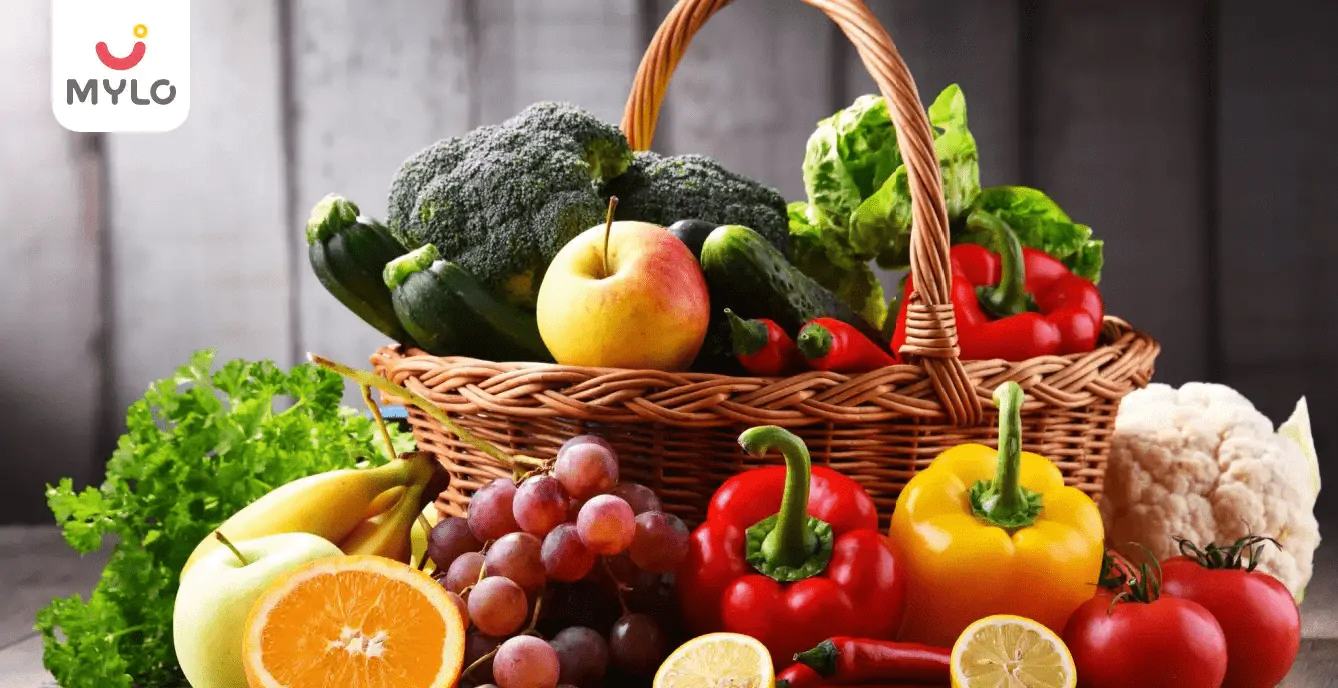Home

The A-Z Guide to Identifying Vegetables Name in English for Children
In this Article

Baby Care
The A-Z Guide to Identifying Vegetables Name in English for Children
Updated on 3 March 2024
Are you ready to turn your little ones into veggie experts? We know that getting kids to eat their veggies can be a challenge, but by introducing them to the wide variety of vegetables name in English out there, you can expand their vocabulary and also pique their curiosity about these nutritious foods. In this article, you'll find a colorful array of vegetables, vegetables chart and tricks to help your little one learn all vegetables name easily.
What are vegetables?
Vegetables are an essential part of a healthy diet. They are edible plants or parts of plants that are consumed by humans as food. Vegetables are packed with nutrients, vitamins, and minerals that are necessary for the growth and development of children.
They come in various shapes, sizes, colors, and textures, making them interesting and appealing to kids. From leafy greens to root vegetables, there is a wide variety of vegetables available that offer different tastes and flavors.
Types of vegetables
There are several types of vegetables that can be categorized based on their edible parts. Some common types include:
1. Leafy green vegetables
These vegetables have edible leaves and include spinach, lettuce, cabbage, and fenugreek. They are rich in vitamins A, C, and K.
2. Root vegetables
These vegetables grow underground and have edible roots. Examples include carrots, radishes, beets, and potatoes. They are a good source of fiber and minerals.
3. Cruciferous vegetables
These vegetables belong to the cabbage family and include broccoli, cauliflower, Brussels sprouts, and cabbage. They are high in antioxidants and have cancer-fighting properties.
4. Allium vegetables
These vegetables belong to the onion family and include onions, garlic, leeks, and shallots. They add flavor to dishes and have antibacterial properties.
5. Stem vegetables
Stem vegetables, as the name suggests, are the edible stalks or stems of certain plants. This category includes vegetables like cauliflower, celery, and sugarcane.
6. Legumes
Legumes are plants that produce pods and include beans, peas, lentils, and chickpeas. They are rich in protein, fiber, and minerals.
Why is it important to learn vegetables name?
It is important to learn vegetables name for kids as it helps them develop a healthy relationship with food. When children are familiar with different vegetables, they are more likely to try and enjoy them. Knowing the names of vegetables also enables children to make informed food choices and understand the importance of a balanced diet. Additionally, learning vegetables' names can enhance a child's vocabulary, language skills, and cognitive development.
Vegetables name in English for kids
To make learning different vegetables names easy for kids, let us take a look at a vegetables name chart, vegetables name list and a vegetables list of Indian veggies.
Vegetables chart
A vegetable chart for kids is a useful tool to learn the names of different vegetables. It provides visual representations of vegetables along with their names. Children can refer to the chart to identify and memorize the names of vegetables. Here is a sample chart for all vegetables name in English:

10 vegetables name all kids must know
Introducing children to a variety of vegetables is crucial for their overall health and well-being. Here are vegetables name that all kids must know:
1. Carrot
Carrots are crunchy and orange vegetables that are rich in vitamin A.
2. Tomato
Tomatoes are juicy and red vegetables that are packed with vitamins and antioxidants.
3. Cucumber
Cucumbers are refreshing and green vegetables that contain high water content.
4. Broccoli
Broccoli is a green vegetable that is loaded with vitamins, fiber, and antioxidants.
5. Spinach
Spinach is a leafy green vegetable that is a good source of iron and calcium.
6. Peas
Peas are small green vegetables that are rich in protein, fiber, and vitamins.
7. Bell pepper
Bell peppers come in various colors and are a great source of vitamin C.
8. Onion
Onions add flavor to dishes and are used in various cuisines worldwide.
9. Potato
Potatoes are versatile vegetables that can be baked, boiled, or fried.
10. Cauliflower
Cauliflower is a white vegetable that is low in calories and high in nutrients.
You may also like: The Ultimate Guide to Teaching Children Tables 1 to 20
Other 20 vegetables name for children
In addition to the 10 vegetables name in English, here are 20 more vegetables names for children to learn:
-
Lettuce
-
Radish
-
Pumpkin
-
Zucchini
-
Eggplant
-
Sweet potato
-
Corn
-
Green beans
-
Asparagus
-
Celery
-
Brussels sprouts
-
Cabbage
-
Mushrooms
-
Artichoke
-
Turnip
-
Okra
-
Avocado
-
Leeks
-
Garlic
-
Ginger
Indian vegetables list
India is known for its rich variety of vegetables used in traditional cuisine. Here is a vegetables list of popular Indian veggies:
-
Bitter gourd
-
Bottle gourd
-
Lady's finger (Okra)
-
Ridge gourd
-
Drumstick
-
Yam
-
Taro root
-
Snake gourd
-
Cluster beans
-
Indian spinach (Palak)
Tips to make learning different vegetables names easy for kids
Learning vegetables name for kids can be made fun and engaging with these helpful tips and tricks:
1. Make it a game
Create a game where children have to identify vegetables based on their descriptions or pictures.
2. Cook together
Involve children in cooking activities and let them name the vegetables they use.
3. Vegetable garden
Start a vegetable garden at home and let children take care of the plants. They will learn the names of vegetables while nurturing them.
4. Storytelling
Tell stories that revolve around vegetables and their importance in a healthy diet.
5. Vegetable-themed crafts
Engage children in arts and crafts activities where they can create vegetable-themed artwork or collages.
6. Field trips
Take children to a local farmer's market or grocery store and let them explore different vegetables.
7. Fun worksheets
Provide children with worksheets or coloring pages that feature vegetables and their names.
Key takeaways
Learning vegetables name is important for children's overall development and a healthy relationship with food. A vegetables chart can be a helpful visual aid for children to identify vegetables. Introduce children to a variety of vegetables, including the 10 vegetables name all kids must know. Encourage children to learn all vegetables name as well including Indian vegetables list using fun and engaging tips to make learning vegetables name in English enjoyable for kids.



Written by
Anupama Chadha
Anupama Chadha, born and raised in Delhi is a content writer who has written extensively for industries such as HR, Healthcare, Finance, Retail and Tech.
Read MoreGet baby's diet chart, and growth tips

Related Articles
Related Questions
Hello frnds..still no pain...doctor said head fix nhi hua hai..bt vagina me pain hai aur back pain bhi... anyone having same issues??

Kon kon c chije aisi hai jo pregnancy mei gas acidity jalan karti hain... Koi btayega plz bcz mujhe aksar khane ke baad hi samagh aata hai ki is chij se gas acidity jalan ho gyi hai. Please share your knowledge

I am 13 week pregnancy. Anyone having Storione-xt tablet. It better to have morning or night ???

Hlo to be moms....i hv a query...in my 9.5 wk i feel body joint pain like in ankle, knee, wrist, shoulder, toes....pain intensity is high...i cnt sleep....what should i do pls help....cn i cosult my doc.

Influenza and boostrix injection kisiko laga hai kya 8 month pregnancy me and q lagta hai ye plz reply me

Related Topics
RECENTLY PUBLISHED ARTICLES
our most recent articles

Pregnancy Best Foods
Grapes in Pregnancy: The Ultimate Guide to Benefits & Precautions

Postpartum Exercise: What to Know About Exercising After Pregnancy
Growth & Development
Baby Crawling: A Parent's Guide to Baby's First Moves

Weight Loss
Postpartum Diet Plan: Your Postpartum Nutrition Guide

Care for Baby
The Ultimate Guide to Crafting the Perfect Baby Photoshoot

Medications
Lupride Injection: How It Works and What You Need to Know
- Why are Some Women Recommended HCG Injection During Pregnancy?
- Sudden Infant Death Syndrome (SIDS): Meaning, Causes & Prevention
- Period After Abortion: What to Expect About Timing, Duration and Frequency
- Thumb Sucking: How to Help Your Child Break the Habit
- The Ultimate Guide on How to Shrink Ovarian Cysts Naturally
- Ashwagandha Benefits for Female & Male Fertility: How This Ancient Herb Can Help You Conceive
- What are the 12 things that parents can do with their baby in the first 12 months?
- The Lowdown on Cetirizine in Pregnancy: A Must-Read for Expecting Moms
- The Ultimate Collection of Paheliyan with Answer for Kids
- The Ultimate Guide to Abdominal Pain After Abortion Causes and Care
- Ovulation Kit 101: A Beginner's Guide to Tracking Fertility & Maximizing Your Chances of Conception
- Is Breast Pain after Abortion Normal? What You Need to Know
- Twin Pregnancy: Signs, Types & Risks
- Chasteberry Benefits: The Natural Remedy You Need for Infertility, Hormonal Imbalance, and PMS


AWARDS AND RECOGNITION

Mylo wins Forbes D2C Disruptor award

Mylo wins The Economic Times Promising Brands 2022
AS SEEN IN

- Mylo Care: Effective and science-backed personal care and wellness solutions for a joyful you.
- Mylo Baby: Science-backed, gentle and effective personal care & hygiene range for your little one.
- Mylo Community: Trusted and empathetic community of 10mn+ parents and experts.
Product Categories
baby carrier | baby soap | baby wipes | stretch marks cream | baby cream | baby shampoo | baby massage oil | baby hair oil | stretch marks oil | baby body wash | baby powder | baby lotion | diaper rash cream | newborn diapers | teether | baby kajal | baby diapers | cloth diapers |




